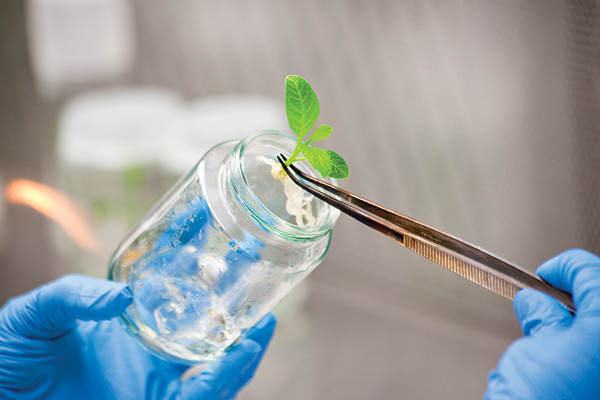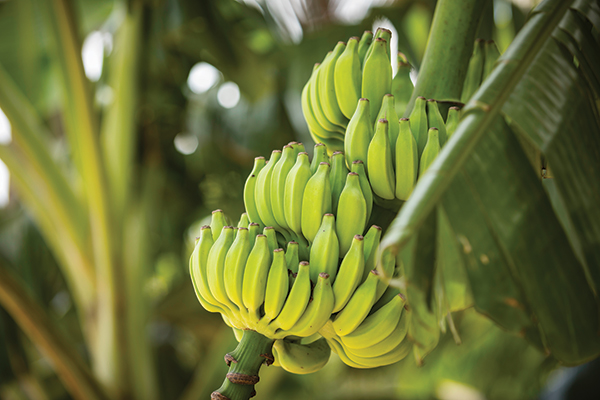Costa Rica’s Congress in March 2022 passed a measure quickly signed into law that legalizes medical use of cannabis and allows for the cultivation of hemp for industrial use. The new law is so fresh that full regulations are yet to be established. But an industrial conference on hemp already has taken place, and examples abound in U.S. states and other territories where legislation has stoked innovation.
A Procomer study reported that the global market for industrial hemp products is valued at more than $5.7 billion and could grow by 22% by 2025. Medicinal marijuana, on the other hand, dovetails well with a Costa Rican medical tourism economy that saw medical tourist visits to the country grow by 400% between 2014 and 2019, when nearly 20,000 medical tourists landed.
In a natural and business environment as fecund as Costa Rica’s, the possibilities are great, with an abundance of organic raw materials. One has only to look to other biomaterials. One new venture is looking to make vegan leather from pineapple plant fiber. Another, from the Netherlands, has been investing in Costa Rica for some time. Its favorite biomaterial?
Bananas.
Or rather, all the biomass connected to the banana tree. Yellow Pallet uses stems to make shipping pallets and blocks. R&D by the company with disease-resistant plants has shown a plantation could yield four times the dry fiber that a forest of traditional wood trees would produce. The company also sells and helps set up turnkey factories for transforming banana plant waste into useful shipping products. Bit by bit, those more sustainable pallets are making a dent in a global industry that uses an awful lot of wood to make 5 billion industrial pallets a year.
In February, the 10-year-old company welcomed Elio Machillanda, its business development director, as the new president of Tarimas de Fibras Agrícolas S.A. “Elio’s contribution during his former role, as well as his achievements, have made him the right candidate to lead our organization in the times to come,” the company said. “Today’s changes are further steps in seeking ways to deliver our mandate of becoming an innovative organization in the area of shipping logistics via the use of agri-fibers in the production of shipping pallets and [their] components.”
Machillanda had barely taken his seat before he responded to questions from Site Selection.
In announcing the company’s change of leadership, Yellow Pallet announced it had been expanding its manufacturing capabilities. How has this manifested itself in Costa Rica?
Elio Machillanda: Yellow Pallet has indeed more than doubled its production capacity in the last quarter. We have achieved this via continued research and development progress in the mix of the fibers used for the production of agri-fiber blocks. Moreover, we have also found ways of processing not only the banana stems, but also the banana pinzotes in the obtention of fiber. [The pinzote is the part of the plant that joins the trunk with the bunch of bananas.] This is a great development as it utilizes a product considered and treated as waste by most if not all banana producers.
What is the company’s current headcount and physical footprint in Costa Rica and globally?
Elio Machillanda: Whilst Yellow Pallet’s internal headcount at its block factory in Siquirres, Costa Rica, remains below 50, it is important to mention the amount of indirect work that we continue to generate in the Siquirres and Limon areas via the contracted harvest of banana stems and the sourcing of other fibers from local companies that also process sustainable fiber residues. This adds to the amount of local purchases and indirect production we are generating as we are developing a significant portion of our machinery also in Costa Rica. Regarding the global footprint, Yellow Pallet BV, headquartered in The Netherlands, is currently undertaking feasibility studies in other tropical countries, with emphasis on banana-producing countries in Latin America and Asia. Yellow Pallet expects to penetrate large banana markets such as Ecuador and Colombia in the near future.

How did the company originally choose to locate operations in Costa Rica?
Elio Machillanda: This was a decision that Yellow Pallet did not take lightly. However, after analyzing all the variables of our business ecosystem, Costa Rica’s sustainability efforts and its Free Trade Zone accessibility made our decision easier. This was of course also driven by Costa Rica’s large banana production as well as its international commerce focus. It is important for us that we use the fiber grown locally to produce shipping pallets that are then used to export as far as possible. This way our environmental impact is largest. We have also considered countries like India, for example, which is the largest banana producer in the world, but where almost the entire production is consumed locally. Thus, we would have easy access to the input, but a lower environmental impact on the transport of the bananas (or other products) shipped.
Describe the new directions the business has taken since you launched operations in Costa Rica.
Elio Machillanda: Yellow Pallet has been and will continue to be heavily skewed toward research and development. Early in our inception we learned of the opportunities that fiber previously considered as waste could bring when used to produce shipping pallets. Since then, we have tested many different types of fiber, not only coming from bananas by the way. We have explored quite a range. The result has been lots of learning that has made our product stronger as well as sustainable. We currently mix different agro-fibers, all of which are sustainably sourced, and all resulting in a product that not only meets but exceeds all international standards for the production and export of shipping pallets to all parts of the world. More recently, the addition of pinzotes of bananas — after chopping and grinding of course — has brought additional value to our supply chain as well as additional strength, since the fiber has proven to be even stronger than that of the stems. Likewise, we continue to process other agri-fibers in the mix, with the end in mind of creating a competitive and sustainable product that our customers can be proud of using.
We aim to find customer companies that truly share the same values whilst we seek to expand our footprint in countries that truly show sustainability efforts. In Costa Rica we were able to find it all.”
— Elio Machillanda, President, Tarimas de Fibras Agrícolas S.A. (Yellow Pallet)
Share with me some specific examples of business support you’ve received from local governments and organizations, and from CINDE.
Elio Machillanda: Procomer has been instrumental since our application to the Free Trade Zone regimen, and to this day continues to guide us as we expand and adopt new business practices. CINDE has become a constant consultant for Yellow Pallet. From providing support in our pursuit of specific suppliers, to creating networks with potential end customers, to feeding macroeconomic data to incentivize investments, to providing guidance and support during government application processes. Last but not least, organizations like the MAG [Ministry of Agriculture and Livestock], which have come to understand and appreciate our business model and continue to support our manufacturing ecosystem.
Describe how your company’s mission embodies the sustainability goals of customer companies as well as of Costa Rica itself.
Elio Machillanda: In our mission statement, we have defined that we focus on developing and producing sustainable logistics solution for moving products globally. Here is where the magic happens. Yellow Pallet is funded by impact investors who truly believe that doing well does not preclude them from doing good. Thus, we aim to find customer companies that truly share the same values whilst we seek to expand our footprint in countries that truly show sustainability efforts. In Costa Rica we were able to find it all. We do have a committed customer base that believes in what we do. Likewise, we continue to find support from Procomer, CINDE, el MAG and other Costa Rican institutions that have been very supportive since our inception and that we hope to continue to have as partners as we continue to grow our footprint.
Sustainability today has evolved as a concept. How is your company also a socially beneficial organization to the country?
Elio Machillanda: Indeed. Sustainability goes well beyond the environment. Thankfully this is a concept that not only Yellow Pallet has embraced but also our partners in business. We all are fully committed to doing the right thing for our communities — our people as well as our environment. Creating local jobs and supporting legitimate businesses practices, day in and day out, are just some of the daily evidence of our values and mission as a company. We are happy about the decision to have set foot in Siquirres as our first manufacturing endeavor and we are looking forward to impacting more local communities in the future to come.

